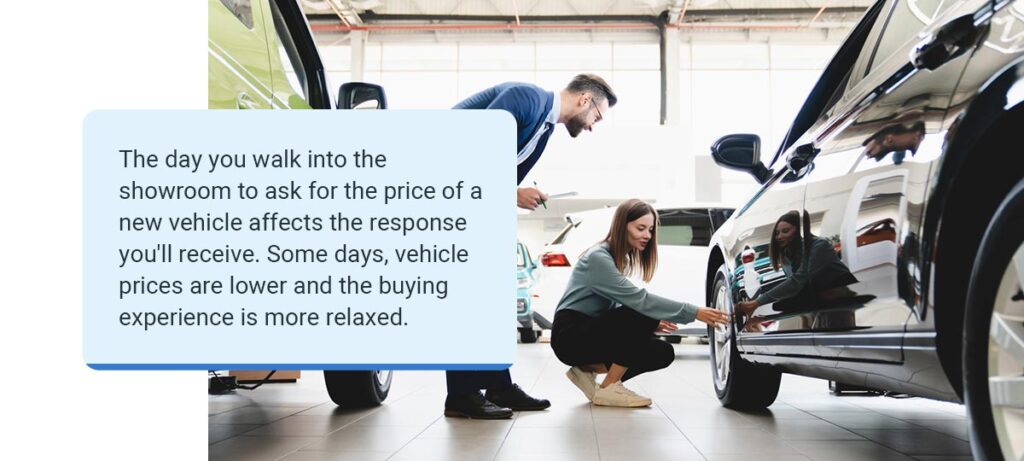
The time you buy a new vehicle could save you thousands of dollars. Knowing the car you need, including particular specifications, is crucial in light of the steady price hike. The expected rise in average transaction price for the sale of new vehicles in 2022 was $46,259 — 11.5% up 2021’s figure. Yet, getting your timing right could protect your purse.
In this article, we’ll talk about these and more in detail.
The two best times to buy a new car are the end of the month and the end of the calendar year. Some months offer better discounts than others. The day you purchase the vehicle may be essential as well. Holidays have also proven to be intelligent alternatives. Here are the reasons why:
Purchasing a car can be challenging, yet, securing it at the end of the month is a great way to go about it. First, dealers have sales targets at the end of every month. When they’re yet to meet their sales quota, dealers tend to be more flexible with pricing. They’re likely to give high discounts to enable them to make more sales. Second, there could be financial deals and manufacturer-sponsored deals during these times.
Although it may be tough to know whether they’ve met their targets, it doesn’t hurt to employ this strategy. Ask questions and test drive the car before agreeing on the deal.
The story is no different at the end of the calendar year — perhaps, even better. You can save up to 10.3% off manufacturer-suggested retail price (MSRP) at the end of the year. Dealers have annual targets. When they meet those targets, there’s little motivation to increase prices. Also, dealers reduce prices to make way for the new models.
For instance, Ford is expected to release the all-new 2023 model of the Ford F-150 later this year. Meaning in November and December, many buyers will be clamoring for the new model. With the demand increasing, the price for the older models begins to drop. As a rule of thumb, car manufacturers usually release new models in the previous year’s fall. Also, interest rates are low in December, making it possible for automakers to offer low-interest loans. Lest we forget, you’ll likely get good discounts in November and December.

Following seasonal trends gives you a good insight into the market. While prices skyrocket in certain months, others offer competitive prices for new automobiles. So, when is the best time to buy a new car? Although you may purchase a vehicle at any time of the year, research shows that months such as May, October, November and December have some of the best deals. Here’s why:
The month of May is the beginning of the busy summer spending season. Auto dealerships tend to roll out the Memorial Day deals early, usually within the month’s first few days or weeks. Targeting this period enables you to take advantage of the cashback, financing and lease deals. Moreover, when car manufacturers release new models in the fall, those cars will likely reach the dealers by late spring. Dealers will likely reduce the prices of older models to make room for the incoming ones.
Besides Halloween, the month of October is also known for saving buyers lots of money. October is the new year for auto manufacturers and dealerships and offers several opportunities. Manufacturers release new cars in the fall, which become the latest talking points. Car enthusiasts compare the older models to the new ones to see if the upgrades are worth considering.
Auto connoisseurs compare the latest models of various brands to see which is the best. As a buyer, you see a diversion — a chance to race into the showrooms and secure one of the incentivized and discounted vehicles.
If you want to protect your wallet while securing a new car, wait until November before making a purchase. Apart from benefiting from sell-offs due to new model releases, it’s no news that Black Friday offers some of the best deals.
The average Black Friday factory discount in 2019 was 10.2% off retail pricing. Although the average manufacturer discount hit an all-time low of $1,628 in 2021, 2022 promises to be better. In any case, you still get some save some cash off the usual market price.
Interestingly, high discounts tend to be the norm throughout the entire month of November. So even if you miss out on Black Friday sales, you may still be able to get a good deal. This also applies if you want to secure the vehicle earlier.
When Santa brings jolly to town in December, dealers and car manufacturers strive to match up the energy, making it possible to save up to 10.3% off MSRP. Dealers look to clean up their monthly, quarterly or yearly sales goals in December. The usual outcome is that dealerships offer appealing cashback and financing deals to increase sales. Additionally, the standard logic of making room for the newer models applies.
During the year’s final month, companies are looking for tax write-offs. This motivates manufacturers to offer attractive lease deals to reflect their business. That trickles down to individuals searching for new vehicles to purchase.

The day you walk into the showroom to ask for the price of a new vehicle affects the response you’ll receive. Some days, vehicle prices are lower and the buying experience is more relaxed.
Contrary to the popular belief that purchasing a vehicle during the busiest times of the week saves money because salespersons have a lot on their plate and want to move to the next customer quickly, choosing a quiet day has practical benefits. Two such days are Mondays and three-day weekends.
Mondays are the best days of the week to purchase a car — the least favorable times being the weekends. With weekends being the busiest periods, Mondays become calm, which is good for business. This allows you to interact with the dealers and ask questions. You may also have the chance to test drive the car before deciding. More importantly, there’s time to negotiate the price.
As average sales tend to reduce on Mondays, dealers are likelier to lower prices to sell more. Dealers understand that fewer customers walk through their doors on the first day of the week, so they’re prepared to accept offers slightly below the minimum retail price. Plus, they often meet their targets during the weekends. Mondays also allow you to speak to lenders to secure a financing deal for the vehicle. Local lenders usually close during the weekends, which leaves you with dealership financing.
Although usual weekends are less suitable for purchasing vehicles, three-day weekends do some impressive magic tricks. The holidays that come immediately before or after the weekends offer jaw-dropping deals. Memorial Day is a typical example. As the summer car season kicks off, automakers and dealers are inclined to provide competitive prices. Another is Presidents’ Day — the third Monday of February.
Labor Day weekends also offer fantastic deals, mainly because it overlaps the fall season sell-offs. Although the Fourth of July is not a typical weekend holiday, car deals are good when they coincide with weekends.

Holiday deals are no secrets, yet, some tend to provide better deals than others. The best holidays to buy a new car include:
Apart from the calendar years, months, weeks and days, pay attention to other relevant details such as the end of the car’s model year, design cycle and cycle life. All these factors impact the market price significantly.
Car manufacturers will continue to produce new cars and improve upon the technology. These new models are released even before the new year begins. This is why you need to be strategic as a buyer. The reason is simple. Auto manufacturers aim to sell more new models, which cost more than the older ones. One way of doing this is to reduce the prices of the older model. Another important determining factor is the increase in demand for the new models.
There have been instances when incoming models have had better incentives than the outgoing, but that is rare. In any case, research to clearly understand the price differences.
Car manufacturers adopt designs for their vehicles and use them for a series of models. The newer models have added features and slight improvements over the previous ones. You may have noticed this with the 2020 to 2023 Toyota Corolla models. When the manufacturers adopt a new design, the older models drop in price. That’s when you strike. You may not be driving the latest, most stylish car, but you’ll save thousands of dollars from that transaction.
It’s usual for automakers to discontinue specific vehicle models. When that happens, the existing models start to depreciate. Manufacturers have different reasons for pulling the plug on vehicles. For instance, the increased demand for SUVs and trucks may persuade them to discontinue their sedan models. Research to learn why the car was discontinued, then make the purchase.
It’s advisable to wait if the car you want to buy is a best-seller or brand new. When the demand is high, dealers spike prices since they’re sure to get a buyer. It’s usually not worth it. The price will go with the trend. Again, when there is a shortage in the production of the vehicle, buyers compete for the car. This allows dealers to add prices to reap maximum profits.
There are three things to keep in mind when negotiating the price for a new car: financing, what to negotiate on and trade-in. Let’s explain these further:
Timing is crucial when buying a new car. This allows you to save money while securing a quality vehicle. So, when is the best time to buy a new car? Purchase the vehicle at the end of the month or the calendar year when salespersons want to make more sales to meet their goals. Holidays and certain months have also proven favorable.
Consider the car’s end of the model year, design cycle and life cycle and adopt effective negotiating tactics to get the best deals. The next important step is to secure auto insurance.
David Pope Insurance offers affordable auto insurance coverages tailored to your needs to help you increase savings. Do your want to learn more about the services we offer? Contact us today!